- Home
- W. Somerset Maugham
Collected Short Stories Volume 4
Collected Short Stories Volume 4 Read online
Table of Contents
About the Author
By the Same Author
Title Page
Copyright Page
Preface
The book-bag
French Joe
German Harry
The four Dutchman
The back of beyond
P & O
Episode
The kite
A woman of fifty
Mayhew
The lotus eater
Salvatore
The wash-tub
A man with a conscience
An official position
Winter Cruise
Mabel
Masterson
Princess September
A marriage of convenience
Mirage
The letter
The outstation
The portrait of a gentleman
Raw material
Straight flush
The end of the flight
A casual affair
Red
Neil MacAdam
Also Available in Vintage OF HUMAN BONDAGE
THE MOON AND SIXPENCE
THE RAZOR'S EDGE
CAKES AND ALE
UP AT THE VILLA
COLLECTED SHORT STORIES
VOLUME 4
William Somerset Maugham was born in 1874 and lived in Paris until he was ten. He was educated at King's School, Canterbury, and at Heidelberg University. He spent some time at St. Thomas's Hospital with the idea of practising medicine, but the success of his first novel, Liza of Lambeth, published in 1897, won him over to letters. Of Human Bondage, the first of his masterpieces, came out in 1915, and with the publication in 1919 of The Moon and Sixpence his reputation as a novelist was established. His position as a successful playwright was being consolidated at the same time. His first play, A Man of Honour, was followed by a series of successes just before and after World War I, and his career in the theatre did not end until 1933 with Sheppey.
His fame as a short story writer began with The Trembling of a Leaf, subtitled Little Stories of the South Sea Islands, in 1921, after which he published more than ten collections. His other works include travel books such as On a Chinese Screen and Don Fernando, essays, criticism, and the autobiographical The Summing Up and A Writer's Notebook.
In 1927 Somerset Maugham settled in the South of France and lived there until his death in 1965.
ALSO BY W. SOMERSET MAUGHAM
Of Human Bondage
The Moon and Sixpence
The Narrow Corner
The Razor's Edge
Cakes and Ale
The Painted Veil
Collected Short Stories Vol. 1
Collected Short Stories Vol. 2
Collected Short Stories Vol. 3
Ashenden
South Sea Tales
Far Eastern Tales
More Far Eastern Tales
For Services Rendered
The Merry-Go-Round
Don Fernando
On a Chinese Screen
Catalina
Up at the Villa
Mrs Craddock
Liza of Lambeth
Ten Novels and their Authors
A Writer's Notebook
The Casuarina Tree
Christmas Holiday
The Magician
Points of View
Selected Plays
Theatre
Then and Now
The Vagrant Mood
The Summing Up
W. Somerset Maugham
COLLECTED
SHORT STORIES
VOLUME 4
This eBook is copyright material and must not be copied, reproduced, transferred, distributed, leased, licensed or publicly performed or used in any way except as specifically permitted in writing by the publishers, as allowed under the terms and conditions under which it was purchased or as strictly permitted by applicable copyright law. Any unauthorised distribution or use of this text may be a direct infringement of the author's and publisher's rights and those responsible may be liable in law accordingly.
ISBN 9781409076421
Version 1.0
www.randomhouse.co.uk
Published by Vintage 2002
6 8 10 9 7
Copyright © The Royal Literary Fund
This electronic book is sold subject to the condition that it shall not by way of trade or otherwise, be lent, resold, hired out, or otherwise circulated without the publisher's prior consent in any form other than that in which it is published and without a similar condition including this condition being imposed on the subsequent purchaser
The Complete Short Stories first published in
Great Britain in 1951 by William Heinemann
First published in four volumes
as theCollected Short Stories in 1975 by Pan Books Ltd
Vintage
Random House, 20 Vauxhall Bridge Road,
London SW1V 2SA
www.vintage-books.co.uk
Addresses for companies within The Random House Group Limited can be found at: www.randomhouse.co.uk/offices.htm
The Random House Group Limited Reg. No. 954009
A CIP catalogue record for this book
is available from the British Library
ISBN: 9781409076421
Version 1.0
Preface
In this final volume I have placed the rest of my stories the scene of which is set in Malaya. They were written long before the Second World War and I should tell the reader that the sort of life with which they deal no longer exists. When I first visited those countries the lives the white men and their wives led there differed but little from what they had been twenty-five years before. They got home leave once in five years. They had besides a few weeks leave every year. If they lived where the climate was exhausting they sought the fresh air of some hill-station not too far away; if, like some of the government servants, they lived where they might not see another white man for weeks on end, they went to Singapore so that they might consort for a time with their kind. The Times when it arrived at a station up-country, in Borneo for instance, was six weeks old, and they were lucky if they received the Singapore paper in a fortnight.
Aviation has changed all that. Even before the war people who could afford it were able to spend even their short leave at home. Papers, illustrated weeklies, magazines reached them fresh from the press. In the old days Sarawak, say, or Selangor were where they expected to spend their lives till it was time for them to retire on a pension; England was very far away and when at long intervals they went back was increasingly strange to them; their real home, their intimate friends, were in the land in which the better part of their lives was spent. But with the rapidity of communication it remained an alien land, a temporary rather than a permanent habitation, which circumstances obliged them for a spell to occupy; it was a longish halt in a life that had its roots in the Sussex downs or on the moors of Yorkshire. Their ties with the homeland, which before had insensibly loosened and sometimes broke asunder, remained fast. England, so to speak, was round the corner. They no longer felt cut off. It changed their whole outlook.
The countries of which I wrote were then at peace. It may be that some of those peoples, Malays, Dyaks, Chinese, were restive under the British rule, but there was no outward sign of it. The British gave them justice, provided them with hospitals and schools, and encouraged their industries. There was no more crime than anywhere else. An unarmed man could wander through the length of the Federated Malay States in perfect safety. The only real trouble was the low price of rubber.
There is one more point I want to make. Most of these stor
ies are on the tragic side. But the reader must not suppose that the incidents I have narrated were of common occurrence. The vast majority of these people, government servants, planters, and traders, who spent their working lives in Malaya were ordinary people ordinarily satisfied with their station in life. They did the jobs they were paid to do more or less competently. They were as happy with their wives as are most married couples. They led hum-drum lives and did very much the same things every day. Sometimes by way of a change they got a little shooting; but as a rule, after they had done their day's work, they played tennis if there were people to play with, went to the club at sundown if there was a club in the vicinity, drank in moderation, and played bridge. They had their little tiffs, their little jealousies, their little flirtations, their little celebrations. They were good, decent, normal people.
I respect, and even admire, such people, but they are not the sort of people I can write stories about. I write stories about people who have some singularity of character which suggests to me that they may be capable of behaving in such a way as to give me an idea that I can make use of, or about people who by some accident or another, accident of temperament, accident of environment, have been involved in unusual contingencies. But, I repeat, they are the exception.
The book-bag
Some people read for instruction, which is praiseworthy, and some for pleasure, which is innocent, but not a few read from habit, and I suppose that this is neither innocent nor praiseworthy. Of that lamentable company am I. Conversation after a time bores me, games tire me, and my own thoughts, which we are told are the unfailing resource of a sensible man, have a tendency to run dry. Then I fly to my book as the opium-smoker to his pipe. I would sooner read the catalogue of the Army and Navy Stores or Bradshaw's Guide than nothing at all, and indeed I have spent many delightful hours over both these works. At one time I never went out without a second-hand book-seller's list in my pocket. I know no reading more fruity. Of course to read in this way is as reprehensible as doping, and I never cease to wonder at the impertinence of great readers who, because they are such, look down on the illiterate. From the standpoint of what eternity is it better to have read a thousand books than to have ploughed a million furrows? Let us admit that reading with us is just a drug that we cannot do without – who of this band does not know the restlessness that attacks him when he has been severed from reading too long, the apprehension and irritability, and the sigh of relief which the sight of a printed page extracts from him? – and so let us be no more vainglorious than the poor slaves of the hypodermic needle or the pint-pot.
And like the dope-fiend who cannot move from place to place without taking with him a plentiful supply of his deadly balm I never venture far without a sufficiency of reading matter. Books are so necessary to me that when in a railway train I have become aware that fellow-travellers have come away without a single one I have been seized with a veritable dismay. But when I am starting on a long journey the problem is formidable. I have learnt my lesson. Once, imprisoned by illness for three months in a hill-town in Java, I came to the end of all the books I had brought with me, and knowing no Dutch was obliged to buy the schoolbooks from which intelligent Javanese, I suppose, acquired knowledge of French and German. So I read again after five-and-twenty years the frigid plays of Goethe, the fables of La Fontaine, and the tragedies of the tender and exact Racine. I have the greatest admiration for Racine, but I admit that to read his plays one after the other requires a certain effort in a person who is suffering from colitis. Since then I have made a point of travelling with the largest sack made for carrying soiled linen and filling it to the brim with books to suit every possible occasion and every mood. It weighs a ton and strong porters reel under its weight. Custom-house officials look at it askance, but recoil from it with consternation when I give them my word that it contains nothing but books. Its inconvenience is that the particular work I suddenly hanker to read is always at the bottom and it is impossible for me to get it without emptying the book-bag's entire contents upon the floor. Except for this, however, I should perhaps never have heard the singular history of Olive Hardy.
I was wandering about Malaya, staying here and there, a week or two if there was a rest-house or a hotel, and a day or so if I was obliged to inflict myself on a planter or a District Officer whose hospitality I had no wish to abuse; and at the moment I happened to be at Penang. It is a pleasant little town, with a hotel that has always seemed to me very agreeable, but the stranger finds little to do there and time hung a trifle heavily on my hands. One morning I received a letter from a man I knew only by name. This was Mark Featherstone. He was Acting Resident, in the absence on leave of the Resident, at a place called Tenggarah. There was a sultan there and it appeared that a water festival of some sort was to take place which Featherstone thought would interest me. He said that he would be glad if I would come and stay with him for a few days. I wired to tell him that I should be delighted and next day took the train to Tenggarah. Featherstone met me at the station. He was a man of about thirty-five, I should think, tall and handsome, with fine eyes and a strong, stern face. He had a wiry black moustache and bushy eyebrows. He looked more like a soldier than a government official. He was very smart in white ducks, with a white topee, and he wore his clothes with elegance. He was a little shy, which seemed odd in a strapping fellow of resolute mien, but I surmised that this was only because he was unused to the society of that strange fish, a writer, and I hoped in a little to put him at his ease.
'My boys'll look after your barang,' he said. 'We'll go down to the club. Give them your keys and they'll unpack before we get back.'
I told him that I had a good deal of luggage and thought it better to leave everything at the station but what I particularly wanted. He would not hear of it.
'It doesn't matter a bit. It'll be safer at my house. It's always better to have one's barang with one.'
'All right.'
I gave my keys and the ticket for my trunk and my book-bag to a Chinese boy who stood at my host's elbow. Outside the station a car was waiting for us and we stepped in.
'Do you play bridge?' asked Featherstone.
'I do.'
'I thought most writers didn't.'
'They don't,' I said. 'It's generally considered among authors a sign of deficient intelligence to play cards.'
The club was a bungalow, pleasing but unpretentious; it had a large reading-room, a billiard-room with one table, and a small card-room. When we arrived it was empty but for one or two persons reading the English weeklies, and we walked through to the tennis courts, where a couple of sets were being played. A number of people were sitting on the veranda, looking on, smoking, and sipping long drinks. I was introduced to one or two of them. But the light was failing and soon the players could hardly see the ball. Featherstone asked one of the men I had been introduced to if he would like a rubber. He said he would. Featherstone looked about for a fourth. He caught sight of a man sitting a little by himself, paused for a second, and went up to him. The two exchanged a few words and then came towards us. We strolled in to the card-room. We had a very nice game. I did not pay much attention to the two men who made up the four. They stood me drinks and I, a temporary member of the club, returned the compliment. The drinks were very small, quarter whiskies, and in the two hours we played each of us was able to show his open-handedness without an excessive consumption of alcohol. When the advancing hour suggested that the next rubber must be the last we changed from whisky to gin pahits. The rubber came to an end. Featherstone called for the book and the winnings and losings of each one of us were set down. One of the men got up.
'Well, I must be going,' he said.
'Going back to the estate?' asked Featherstone.
'Yes,' he nodded. He turned to me. 'Shall you be here tomorrow?'
'I hope so.'
He went out of the room.
'I'll collect my mem and get along home to dinner,' said the other.
'We mig
ht be going too,' said Featherstone.
'I'm ready whenever you are,' I replied.
We got into the car and drove to his house. It was a longish drive. In the darkness I could see nothing much, but presently I realized that we were going up a rather steep hill. We reached the Residency.
It had been an evening like any other, pleasant, but not at all exciting, and I had spent I don't know how many just like it. I did not expect it to leave any sort of impression on me.
Featherstone led me into his sitting-room. It looked comfortable, but it was a trifle ordinary. It had large basket arm-chairs covered with cretonne and on the walls were a great many framed photographs; the tables were littered with papers, magazines, and official reports, with pipes, yellow tins of straight-cut cigarettes, and pink tins of tobacco. In a row of shelves were untidily stacked a good many books, their bindings stained with damp and the ravages of white ants. Featherstone showed me my room and left me with the words:
'Shall you be ready for a gin pahit in ten minutes?'
'Easily,' I said.
I had a bath and changed and went downstairs. Featherstone, ready before me, mixed our drink as he heard me clatter down the wooden staircase. We dined. We talked. The festival which I had been invited to see was the next day but one, but Featherstone told me he had arranged for me before that to be received by the Sultan.
'He's a jolly old boy,' he said. 'And the palace is a sight for sore eyes.'
After dinner we talked a little more, Featherstone put on the gramophone, and we looked at the latest illustrated papers that had arrived from England. Then we went to bed. Featherstone came to my room to see that I had everything I wanted.
'I suppose you haven't any books with you,' he said. 'I haven't got a thing to read.'
'Books?' I cried.
I pointed to my book-bag. It stood upright, bulging oddly, so that it looked like a humpbacked gnome somewhat the worse for liquor.
'Have you got books in there? I thought that was your dirty linen or a camp-bed or something. Is there anything you can lend me?'

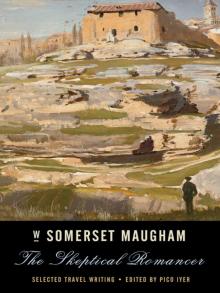 The Skeptical Romancer: Selected Travel Writing
The Skeptical Romancer: Selected Travel Writing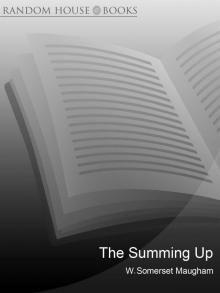 The Summing Up
The Summing Up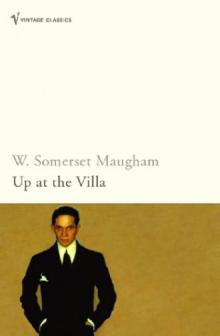 Up at the Villa
Up at the Villa The Razor's Edge
The Razor's Edge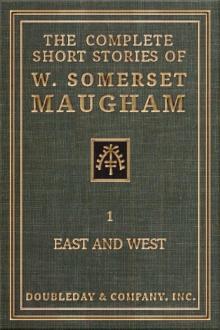 The Complete Short Stories of W. Somerset Maugham: East and West (Vol. 1 of 2))
The Complete Short Stories of W. Somerset Maugham: East and West (Vol. 1 of 2))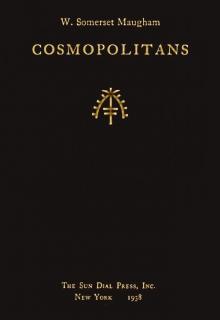 Cosmopolitans
Cosmopolitans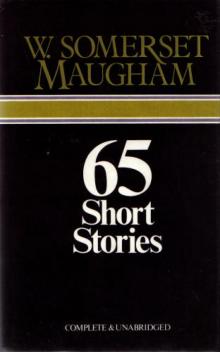 65 Short Stories
65 Short Stories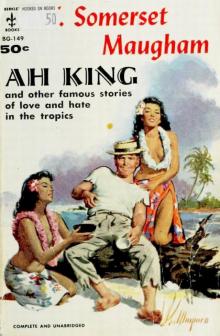 Ah King (Works of W. Somerset Maugham)
Ah King (Works of W. Somerset Maugham)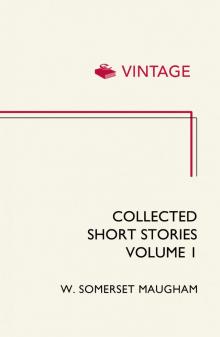 Collected Short Stories: Volume 1
Collected Short Stories: Volume 1 Collected Short Stories Volume 2
Collected Short Stories Volume 2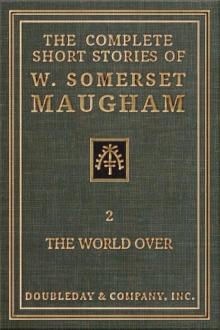 The Complete Short Stories of W. Somerset Maugham - II - The World Over
The Complete Short Stories of W. Somerset Maugham - II - The World Over Collected Short Stories Volume 4
Collected Short Stories Volume 4 Theatre
Theatre Short Stories
Short Stories Then and Now
Then and Now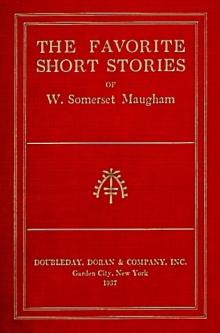 The Favorite Short Stories of W. Somerset Maugham
The Favorite Short Stories of W. Somerset Maugham Of Human Bondage
Of Human Bondage The Magician
The Magician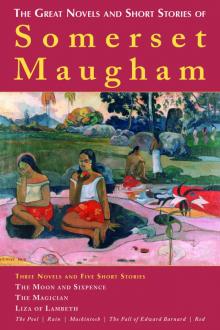 The Great Exotic Novels and Short Stories of Somerset Maugham
The Great Exotic Novels and Short Stories of Somerset Maugham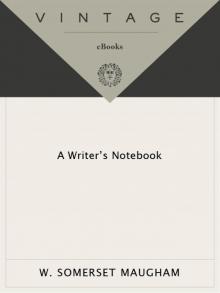 A Writer's Notebook
A Writer's Notebook Christmas Holiday
Christmas Holiday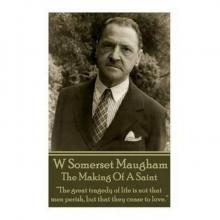 The Making of a Saint
The Making of a Saint Merry Go Round
Merry Go Round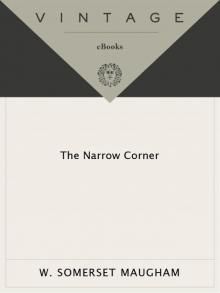 The Narrow Corner
The Narrow Corner Collected Short Stories Volume 3
Collected Short Stories Volume 3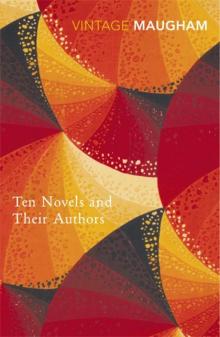 Ten Novels and Their Authors
Ten Novels and Their Authors Ashenden
Ashenden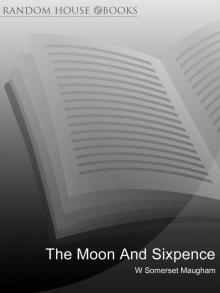 The Moon and Sixpence
The Moon and Sixpence Cakes and Ale
Cakes and Ale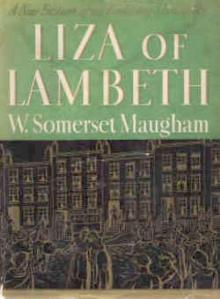 Liza of Lambeth
Liza of Lambeth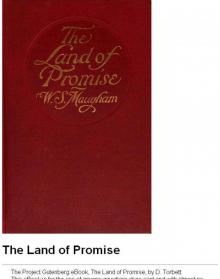 The Land of Promise: A Comedy in Four Acts (1922)
The Land of Promise: A Comedy in Four Acts (1922)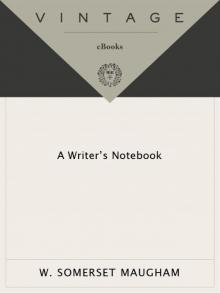 A Writer's Notebook (Vintage International)
A Writer's Notebook (Vintage International)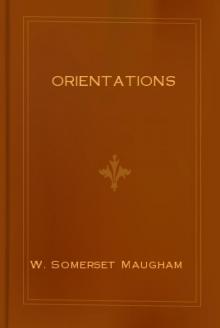 Orientations
Orientations Selected Masterpieces
Selected Masterpieces Mrs Craddock
Mrs Craddock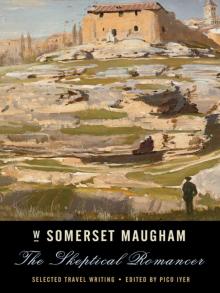 The Skeptical Romancer
The Skeptical Romancer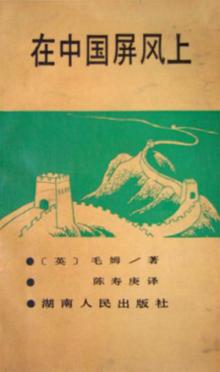 On a Chinese Screen
On a Chinese Screen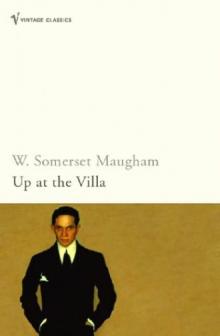 (1941) Up at the Villa
(1941) Up at the Villa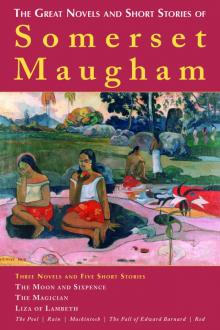 The Great Novels and Short Stories of Somerset Maugham
The Great Novels and Short Stories of Somerset Maugham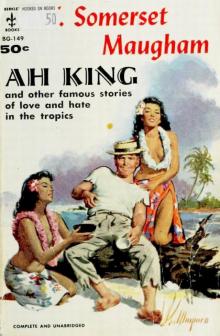 Ah King
Ah King The Explorer
The Explorer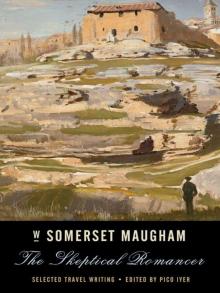 The Skeptical Romancer: Selected Travel Writing (Vintage Departures)
The Skeptical Romancer: Selected Travel Writing (Vintage Departures)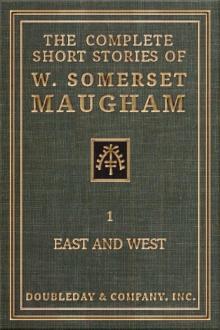 The Complete Short Stories of W. Somerset Maugham - I - East and West
The Complete Short Stories of W. Somerset Maugham - I - East and West